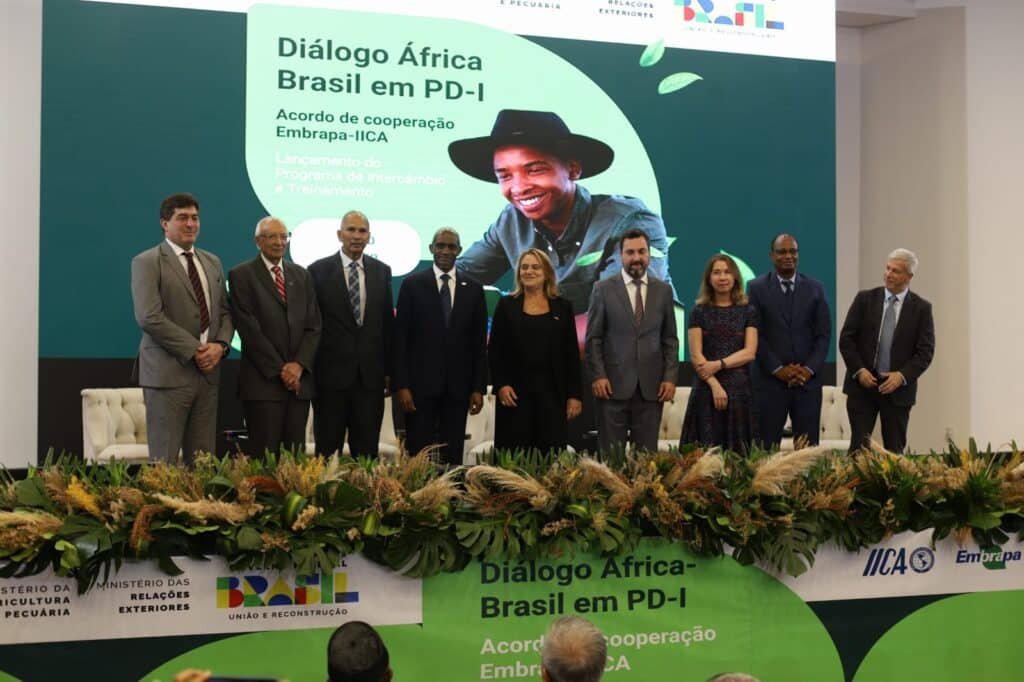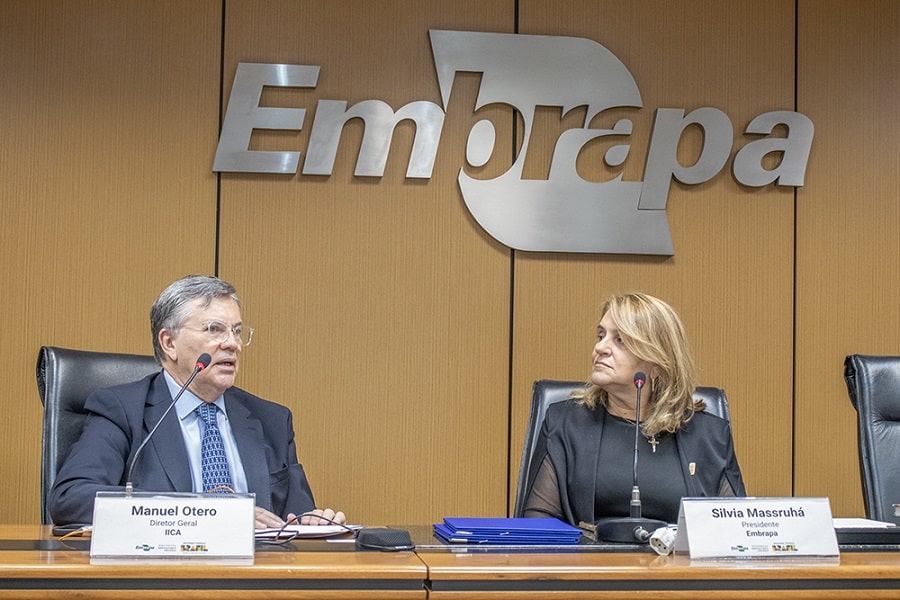
Experts and high-level officials affirmed that Africa and the Americas, especially Brazil, are destined to play a crucial role in global food security, facing shared challenges and opportunities that foster strong international cooperation. This conclusion was highlighted during the Africa-Brazil Dialogue on Agricultural Research, Development, and Innovation.
Brasília, March 19, 2025 – Africa and the Americas, particularly Brazil, are set to play a crucial role in global food security and share common challenges and opportunities that support the establishment of strong international cooperation.
This was affirmed by experts and high-level officials participating in the Africa-Brazil Dialogue on Agricultural Research, Development, and Innovation, jointly organized by the Brazilian Agricultural Research Corporation (EMBRAPA), the Brazilian Cooperation Agency (ABC), and the Inter-American Institute for Cooperation on Agriculture (IICA).
The event, held at EMBRAPA’s headquarters in Brasília, underscored the commitment of the Brazilian government and IICA to reciprocal collaboration with Africa, aimed at advancing agricultural transformation and addressing the root causes of food insecurity, malnutrition, and environmental degradation.
Renowned soil scientist Rattan Lal, considered the world’s leading authority on soil sciences and a Goodwill Ambassador for IICA, was the keynote speaker at the event. He stated that it is possible to replicate in Africa what he called the “Cerrado miracle” in Brazil, a biome that has been at the center of the country’s agricultural revolution, turning it into one of the world’s leading food producers in recent decades.
The opening session featured the participation of Sílvia Massruhá, President of EMBRAPA; Ismahane Elouafi, Executive Managing Director of the Consultative Group on International Agricultural Research (CGIAR); Luis Rua, Secretary of Trade and International Relations at Brazil’s Ministry of Agriculture and Livestock; Maria Luiza Lopes da Silva, Deputy Director of the Brazilian Cooperation Agency (ABC); Aggrey Agumya, Executive Director of the Forum for Agricultural Research in Africa (FARA); Jean Jacques Muhinda, Regional Director of the Alliance for a Green Revolution in Africa (AGRA); and IICA Director General Manuel Otero.
IICA’s Director of Technical Cooperation, Muhammad Ibrahim, was also present at the event.
“Partnerships like these strengthen us. This event symbolizes the spirit of cooperation and learning that guides us. It is a space for science and innovation to promote sustainable agriculture, as we are convinced that international cooperation is essential for the exchange of experiences and knowledge,” said Massruhá on behalf of EMBRAPA, a public company that has been instrumental in transforming Brazilian agriculture into a global model of productivity and sustainability.
Massruhá highlighted IICA’s collaboration in Brazil and emphasized that the country has built a tropical agriculture sector that has turned challenges into opportunities. “EMBRAPA operates throughout Brazil, covering all biomes and focusing on strategic issues for the sector’s development, from family farming to agribusiness. Brazil is proof that investing in science and technology is always the best path. We want to share our learnings and continue learning from Africa.”
Professor Lal, recipient of the 2020 World Food Prize and co-recipient of the Nobel Peace Prize, asserted that Africa can become the world’s breadbasket if it develops its full potential, given that it has enough land to feed nine billion people. In this regard, he pointed to Brazil as a positive example.
“I first came to Brazil in 1975. The Cerrado was a desert, and since then, it has undergone a revolution that has transformed it into one of the world’s largest food-producing regions. Africa’s Guinean Savannah shares many similarities and can undergo the same transformation,” stated Lal.
The scientist emphasized the need for political will to invest in agricultural development at the same level that Africa currently spends on food imports, in order to bridge the productivity gap.
Lal questioned why the Green Revolution did not reach Africa and argued that one of the reasons is the prohibitive cost of fertilizers and other agricultural inputs for small-scale farmers, who produce between 70% and 80% of the continent’s food supply.
He concluded his presentation with a detailed roadmap that, with the necessary investments, could allow Africa to replicate Brazil’s experience—by expanding irrigated farmland, increasing fertilizer use, improving soil health, and encouraging farmers to engage in carbon sequestration.
Challenges and opportunities
During the event, details were shared about a cooperation agreement between EMBRAPA, ABC, and IICA, under which around 30 researchers from scientific institutes, universities, and government agencies in African countries will travel to Brazil for knowledge exchange on technologies that promote food security, regenerative agriculture, and land restoration.
Technical panels also took place, discussing the main challenges and opportunities for developing common agricultural strategies between Africa and Brazil, as well as strategies to enhance technical knowledge exchange and researcher collaboration.
Among the participants, alongside government officials, researchers, and ambassadors from African countries, was IICA’s Representative in Brazil, Gabriel Delgado.
Speaking on behalf of CGIAR, the world’s largest network for agricultural research and innovation, Ismahane Elouafi praised the joint efforts of EMBRAPA and IICA, stating that sharing experiences and knowledge in science, technology, and cooperation is essential to building resilient and productive agri-food systems.
“Africa and Brazil share many challenges, including water management and soil degradation, but they also share solutions that can be scaled up through South-South cooperation. The transformation of Brazil’s Cerrado offers valuable lessons for Africa,” she emphasized.

Manuel Otero, Director General of IICA, and Sílvia Massruhá, President of EMBRAPA.
Otero highlighted the leadership of Brazil’s Minister of Agriculture and Livestock, Carlos Fávaro, in strengthening Brazilian agriculture on the global stage, as well as the efforts of ABC Director, Ambassador Ruy Pereira. He also praised EMBRAPA’s track record in guiding Brazil’s agricultural revolution through tropical agriculture technologies, many of which could be adapted for Africa while respecting local realities and needs.
“IICA has a historic mission to strengthen agriculture. That mission cannot be fulfilled if we exclude Africa, with which we share many characteristics and historical ties. Our continents face common challenges but also have cooperation opportunities that we must capitalize on. Africa holds nearly 60% of the world’s uncultivated arable land. Meanwhile, Brazil has transformed regions like the Cerrado into highly productive agricultural areas.”
“The physical distance between the Americas and Africa is vast in kilometers, but the challenges we face bring us closer. We are establishing a joint agenda to ensure food security while protecting natural resources,” concluded Otero.
More information:
Institutional Communication Division.
comunicacion.institucional@iica.int











